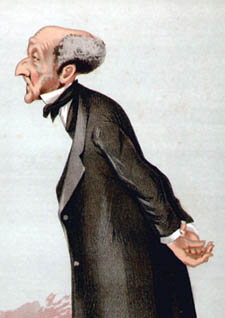
John Stuart Mill on the cover of Vanity Fair Magazine in March 1873 |
J S Mill and his pleasure principle
The ultilitarian philosopher knew there is more to life than simply satisfying desires, writes Peter Cave.
Sex occupies an absurdly disproportionate place in human life. So declared John Stuart Mill, the great philosopher, economist and Victorian gentleman. Mill might thereby seem miles away from any freewheeling sexual living Soho-style – and not just because he is dead and buried in Avignon.
True, he was a local lad, being born in Rodney Terrace, Pentonville, on May 20 1806. True, he grew up in Newington Green; later on, associated with Gower Street’s new University of London; and eventually became MP for Westminster. But Mill and Sohemian sex…?
No, this is no exposé of our John Stuart as lover of latex, purveyor of pornography or practitioner of the sado-masochistic arts. After all, Disraeli described him as akin to a finishing school’s headmistress. Mill was, though, the man par excellence who fought for toleration, individuality and experiments in living. Laws, customs and taboos that restrict individuals’ sexual antics were, for Mill, “superstitions and barbarisms of the human race’s infancy” – as were those laws and customs which discriminated against women, atheists and the poor. No doubt Mill would be amazed at today’s sex shops; would argue for pleasures higher than those courtesy of vibrators, drugs and plunge bras; but would also insist on adults being free to live lifestyles of their choice. This is Mill’s great Liberty Principle.
Typically we ought not to harm non-consenting others, but even if harms occur, the activities might be rightly permitted as promoting overall happiness. Witness how we allow motoring, supermarkets and car alarms, knowing full well that people get maimed, small businesses go bust and blood pressures rise. Mind you, with alarms there is little justification for toleration, given they are ignored by sundry and all.
Mill’s Liberty Principle defends free speech – even free cartooning. Many godly believers are easily offended; many find homosexual lifestyles disgusting. Some of us find offensive shouted predictions that non-believing friends will suffer eternal damnation. Preserving free speech, though, is more vital than stopping offence. Mill would have rejected the latest restrictions on demonstrations near parliament and glorification talk. In his own day he leapt to defend Speakers’ Corner when the authorities tried to close it down.
Mill was a radical reformer. Improve living standards and education; then people would be better able to make informed choices. This would lead to the greatest happiness of the greatest number, the utilitarian ideal – “utility” meaning happiness, pleasure, flourishing. Mill’s utilitarianism built on Jeremy Bentham.
Simply satisfying desires, thought Mill, unlike Bentham, does not automatically make for flourishing lives. People might be harmed through brain damage: they might then have all their desires satisfied, their desires being so minimal; yet they would not be flourishing. “Tis better,” says Mill, “to be a dissatisfied Socrates than a satisfied pig.”
Some pleasures are higher than others. Mill realised this after a bout of severe depression, which he escaped through encountering Wordsworth, Coleridge – and falling in love. Pity she was Mrs Harriet Taylor. He waited 20 years before being free to marry her. Such patience!
Poetry gives higher quality pleasure than pushpin (a child’s game). The arts, landscapes, concern for others, all contribute to flourishing living. Mill would be depressed by individuals sticking dirty shoes on bus-seats, by pointlessly revving motorcycles, by failing to control children – and by alarms going off. (Mill is not for ‘anything goes’. When people voluntarily take on obligations, they ought not to ignore them later on. Having children generates obligations to the children; if we cannot afford to bring them up well, we ought not to have them. Thus, Mill supported birth control – controversial at the time – and even spent some nights in gaol as a result. Despite Mill’s liberal credentials, he would not fall for ‘the right to have children’. Let’s make more people happy – rather than make more happy people.
Mill’s leading principle is the essential importance of human development in its richest diversity. He spoke of the ‘Religion of Humanity’, optimistic that fellow feeling would increase with improved conditions and education. Some of us might lack the optimism.
In view of current religious terrors, Mill would no doubt be prepared these days to delete the ‘religion’, settling simply for ‘humanity’. After all, humanity is all we’ve got – and Mill is our man for humanity.
|

